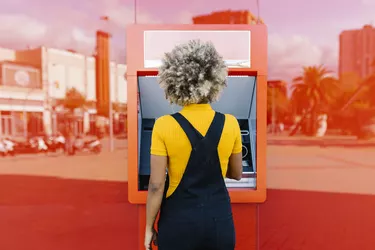
Credit cards have personal identification numbers, but they aren't used as frequently as they are with debit cards. In addition, credit cards often require you to use security codes (which usually appear on the back of the card), while debit cards don't.
Different types of payment methods require different types of security measures. Understanding what a PIN number is, how to receive or create one and how it's used by credit card companies and merchants will help you take advantage of one more layer of protection for your personal finances.
Video of the Day
Video of the Day
What Is a PIN Number?
A personal identification number is usually a four-digit number assigned to a debit or credit card, which only the owner of the account/cardholder should know. While some cards come with a PIN generated by the card issuer, experts recommend changing that PIN to something new.
When you call to talk to a customer service representative about your account, they can't tell you your PIN because it's not available in your account information. It's that personal to you. At best, the rep can have a new PIN assigned and mailed to you. Once you receive it, you should change it.
Another security measure you should take is not to use your birthday, street address or any other number (like your phone number) that determined hackers might easily be able to guess. In addition, you should create different personal identification numbers for your different financial accounts. That way, if someone is able to get the PIN number to one of your accounts, they won't be able to use it to get into your other accounts.
Cards also come with verification numbers that are printed on them, Capital One says. The different types include card verification value (CVV), card validation code (CVC), card security code (CSC) and card identification (CID). These are three-digit numbers printed on the back of the card (or the four-digit code on the front of an American Express card).
Credit Card PIN vs. Debit Card PIN
Credit card PINs and debit card PINs are basically the same: four-digit numbers that are assigned or that you create. Depending on your bank or credit card company, you probably won't receive your personal identification number when you receive your card in the mail. That way, if the envelope is lost or stolen, the thief won't have your PIN. Your PIN will come in a separate mailing a few days later, or you'll be asked to call in and request one or go online and create one.
Why the Numbers Are Used
Personal identification numbers provide a layer of security. If a thief has your credit or debit card, they won't be able to use it when a transaction they're trying to make (such as an ATM withdrawal or an online banking transaction) requires a PIN.
PIN numbers are required more often for debit card transactions than credit card transactions, which might also require a signature. Some credit card companies, like Visa and Mastercard, believe this is more convenient than PINs for their customers. Credit card transactions are also more likely to require that you enter the three-digit security code on the back of the card rather than your PIN.
How to Get a PIN Number
To get a personal identification number for your credit card, call the number on the back of your card and navigate until you can get to a financial adviser or associate. Ask if your card came with a PIN and if it was mailed to you. If you did not receive the PIN in the mail, if you lost it or if you don't remember it, ask for instructions on how to reset your PIN.
You might have to let the bank reset your PIN number and send you the number in the mail. A phone agent won't be able to give you a new PIN during the call. You might be able to log in to your online account and change it yourself.
In the end, the best layer of protection for your credit card may be you. In other words, monitor charges on your accounts, the Consumer Financial Protection Bureau says. If you notice charges that you did not make or other suspicious activity, contact your credit card company immediately.